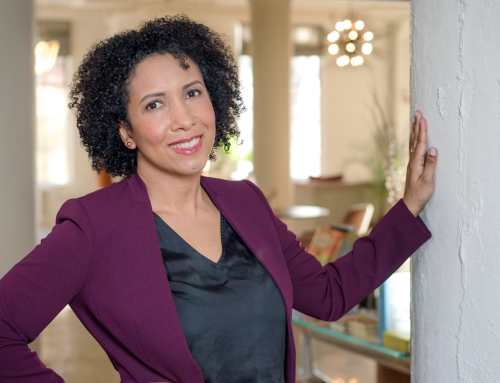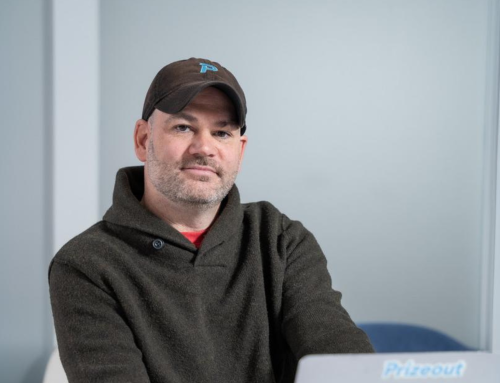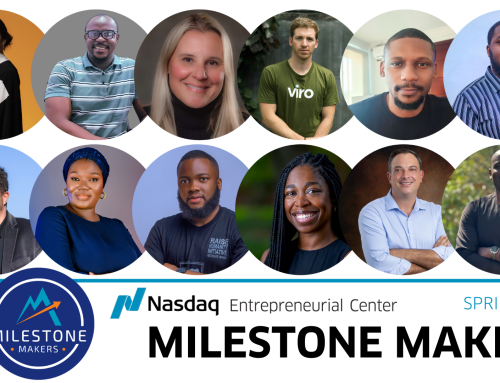Mimi Chan is the founder & CEO of Littlefund, a new, more intentional way for family and friends to gift savings to a fund dedicated to a child’s future goals and dreams. For instance, instead of gifting clothing that’s outgrown or toys that will be donated, family and friends can choose to gift a monetary amount that grows at 1% APY in compounding cash rewards. Chan took a moment to update the Nasdaq Entrepreneurial Center on her journey as a founder so far.
What does “entrepreneurship” mean to you?
MC: Entrepreneurship means dreaming, creating, building, and sacrificing for change. I believe if you choose entrepreneurship, you are choosing to take on a mission to bring the world what you believe is missing and then, ultimately, improving the lives of others.
Could you describe the a-ha moment to lead to Littlefund?
MC: I was inspired to start Littlefund after becoming a parent to our daughter Liv. Though I appreciated the material gifts received from family and friends for her, I felt guilty. Most went unused or donated. I wanted to find a way to better align a person’s support with a child’s needs and desires. As I spoke with family and friends about this problem, I realized our generation’s values had changed there had been a shift away from hyper consumerism yet no simple and clear alternative to material gifting existed. This took me on the mission to reimagine gifting.
The aha moment came twice, when I had the idea, and then after we launched. So as you can imagine, there was a long time in between filled with insecurity, self-doubt, paranoia, and just pure hard work. Launching the product to the world made this journey more real because it became real to others. We’ve received positive feedback from the market which gives us promising signals we’re on to something.
What is the biggest experience or lesson gained on your journey so far?
MC: My resilience has been tested over and over. More than I knew it was capable of being tested.
It was during Demo Day for 500 Startups preparation that I realized my ability to maintain composure or quickly rebound from adversity would be the secret to fulfilling the Littlefund mission. Our beloved nanny had to leave without notice after she was unexpectedly diagnosed with stage 3 lung cancer. Within a matter of minutes, our child care and support system were gone. Finding last minute, trusting care, was a whole new level of stress for both my husband and I — he was in the midst of a fundraising round for his own startup and we had no family nearby to help. I had so many emotions to sort through but didn’t have the adequate time to sort because I was focused on finding a solution. In the end, I survived, we survived, and our nanny was able to get the treatment she needed to survive.
I expected building a tech startup was going to be a tough journey, but I never fathomed the physical toll it would take on me. This time around felt different from the past. I’m older and wiser. I’m in constant recovery, reset, and go mode. The only way I can describe it to others is to call it an emotional rollercoaster without a clear end. When funding didn’t go the way we hoped, hires didn’t pan out, or the product didn’t behave the way we wanted it to, I had to figure out how to forge on and rally the team quickly to keep moving forward. Entrepreneurs make sacrifices, some of which you are cognizant of, and others you only realize you’ve made in hindsight.

How is your company changing the landscape?
MC: Littlefund is going against the grain but we’re confident that the timing is right for a company like ours to exist so we believe we won’t be against the grain in the long term. There was a time when paying to sleep on someone’s couch “would never work” or “getting in stranger’s car is crazy” left people wide-eyed. There’s a white space and families are underserved in the financial landscape. Littlefund’s mission is to inspire people to invest in a child’s future, one gift at a time.
What do you wish you knew when you started?
MC: I’ve learned through my entrepreneurship journey to have more confidence in my intuition. In retrospect, my gut knew the best decision for me, team, and product. Especially when it came to consumer messaging– telling an authentic story that resonates. Not telling the story that investors are guessing consumers want. That’s the other thing I want to share- to not place so much confidence in investors, it’s okay if they disagree with you because no one knows what you’re vision is better than you do.
What is your professional and personal mission statement?
MC: When I was younger, I was struck by this beautiful quote from Eleanor Roosevelt and I’ve kept it as a reminder to not be afraid to dream big and go for it: “The future belongs to those who believe in the beauty of their dreams.” The second thing I keep with me is something an advisor told me when things got really tough in my last startup, “Startups are like football. You play until the game is over. Don’t lose hope or quit before the clock runs out. Hail Marys are possible.”
What advice do you have for fellow entrepreneurs about building and leading teams?
MC: When you start, all you have is you and your idea so that’s why I make sure that what I am doing is something I believe wholeheartedly in. It’s true when people say it won’t feel like work if you are choosing a problem you are passionate about solving. When working with others, invest in communication. Just as in a personal relationship, it’s the foundation to everything else. It’s what holds you accountable to the company’s goals, team and vice versa.
Where do you find inspiration when faced with challenges?
MC: My husband and daughter. None of this would be possible without their constant support. They also play an important role in my productivity. Some people work out to reset. I spend time with my family and let my mind not be on work.
What does “success” look like for you? What do you think will help you achieve it?
MC: Success is a state of mind. I know that I am already successful in different areas of my life. I am a mother- a title that I am proud to serve. I am a wife to an incredible husband and teammate in life. I have wonderful family and friends. Professional life- I am proud to spend time on work that is of service to others. My ultimate goal is to leave a legacy with Littlefund as a company that gets to start every child’s life journey and set the next generation’s path to success. For me to achieve this, it will take personal discipline and diligence to get there but also a community of the smartest families rallying together for this future we envision.
Could you give some examples of the biggest highs and lows that are part of the founder’s journey?
MC: Proudest – launch day. Darkest – everything before launch and after launch. Highs are when people are showering you with congrats and love. Lows are when you constantly live in fear of running out of money or that you don’t achieve product market fit.
Many entrepreneurs continue to perfect their daily routines to support their work and greater vision; would you mind sharing your morning routine or a regular ritual that grounds your work each day?
MC: It took me about a year to figure out my workflow and put into practice daily preparation and ruthless prioritization. I’m still not an expert at it and I admire those who are. I’ve made a conscious effort to set myself up to be success-oriented versus task-oriented. My most important decision at work every morning is how I will choose to spend my time. I spend a majority of it focused on the two things that I believe would provide the greatest value toward our overall success goals. Then the small things, I don’t sweat. I had to learn what the small things were —t hey used to be clustered in with everything as a to-do list.
Has being a female entrepreneur helped or discouraged you in your context? What do you think would help women, entrepreneurs and leaders, the most?
MC: There are moments that are discouraging when the playing field is obviously not equal or fair, especially as a woman in Fintech, but I’ve learned to forge on. I surround myself with those that are supportive. I also look to my peer mentors to share stories and get their perspectives on situations. It’s going to take time and major cultural shifts for women entrepreneurs to have the same opportunities and confidence, especially from investors, to do the same jobs. It’s happening though, I see the wheels in motion. Discussions that bring awareness to the issues and advocates, both men and women, putting initiatives forward to focus and fund female entrepreneurs are especially important in making change happen.




Invite a Friend
Close